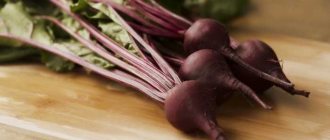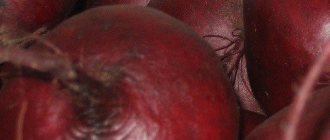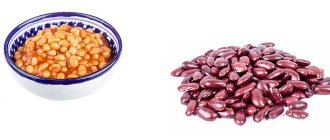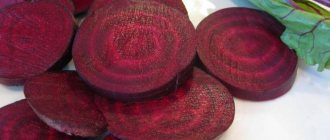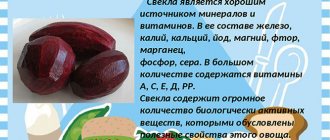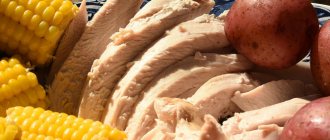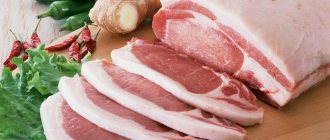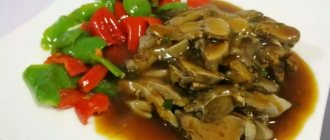Beetroot is a herbaceous biennial plant. This interesting vegetable was first mentioned by the Assyrians more than two thousand years BC. Its cultivation occurred a thousand years later. Beets are mentioned in ancient Greek chronicles as offerings to the gods. After five hundred years, this vegetable reached Europe. At the same time, Europeans liked the tops more, which were used in preparing various dishes, while in Asia they appreciated the juicy and satisfying roots.
Beetroot appeared in Rus' around the eleventh century. She began her march from the Principality of Kyiv and quite quickly spread throughout the Moscow and Novgorod lands. Gradually, beet crops advanced even to the territory of the Far North. But beets have taken root best in Ukraine. The world-famous Ukrainian borscht firmly entered everyday life in the sixteenth century.
Dietary properties:
How many calories are in boiled beets, what dietary properties they have, all this is of great interest to those who lead a healthy lifestyle and monitor their health and figure. So we will try to answer these questions in the following article.

There are relatively few calories in boiled beets, so they can be recommended to people watching their figure as a good addition to their diet.
Boiled beets can be considered an excellent immunomodulator. The complex of vitamins and minerals found in boiled root vegetables strengthens the immune system and protects against the harmful effects of viruses and microbes. During a period of high incidence of ARVI and influenza, boiled beet salad will be an excellent preventive measure. If you add garlic and fresh herbs to such a salad, the effectiveness of the salad will be higher due to the phytoncides contained in garlic.
Beetroot juice is an excellent remedy for hardened or dilated veins, and it is good for combating blood clots caused by high blood pressure or some other cardiac dysfunction.
The presence of calcium in boiled beets ensures normal nutrition of the cells of our body, and the chlorine content will help to effectively cleanse the liver, gall bladder and kidneys, causing lymph to circulate more actively in all parts of the body.
Layered salad of beets and pink salmon with sour cream
This light festive, unusually juicy salad will leave an unforgettable impression and decorate any table.
Compound:
- 1 beet;
- 2 chicken eggs;
- 100 g canned pink salmon;
- 100 g cheese;
- 200 g sour cream;
- a bunch of dill;
- 100 g walnuts;
- salt, optional.
Preparing beet salad with sour cream:
- Grind the boiled beets on a coarse grater and place on a wide flat dish.
- Finely chop the dill, salt it and mix with sour cream. Lubricate the beet layer with the resulting dressing.
- Grate and place the cheese on the dish as a second layer. If you can't find feta cheese, you can replace it with any soft cheese of similar consistency.
- Evenly distribute half of the finely grated whites. Lubricate with our dressing.
- Chop pink salmon and cover with sour cream mixture.
- Place the remaining egg whites and spread the rest of the dressing evenly.
- Sprinkle the salad with crumbled yolks and chopped nuts. Decorate with dill sprigs.
The calorie content of the dish is 253 kcal.
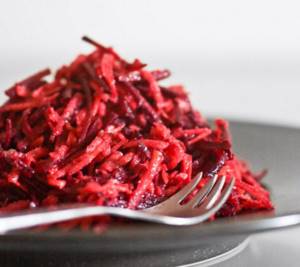
Composition of boiled beets:
Vitamins:
| Vitamin: | WITH | IN 1 | AT 2 | AT 4 | AT 5 | AT 6 | RR | TO |
| in mg. per 100 grams | 3.6 | 0.027 | 0.04 | 6.3 | 0.145 | 0.067 | 0.33 | 0.2 |
Minerals:
| Mineral: | Calcium | Phosphorus | Magnesium | Potassium |
| in mg. per 100 grams | 16 | 38 | 23 | 305 |
Another very important benefit of this dish. During the cooking process, during heat treatment, the nutritional properties of this vegetable are almost not lost.
Cooking sequence
Clean and rinse beets and carrots. Cut into strips and add finely chopped parsley root. If you like, you can replace the parsley root with celery root.
Place the vegetables in a saucepan, season with vegetable oil and vinegar, add a little water and simmer over low heat for an hour under the lid, remembering to stir.
Bring to readiness, add flour and stir. Then add sour cream, sugar and bay leaf, mix and simmer for another 10 minutes. Let cool slightly and serve.
The calorie content of the dish is 126 kcal.
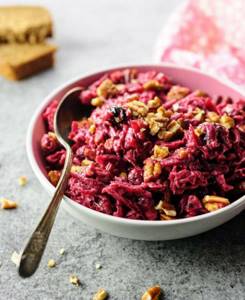
Calorie content of boiled beets in 100 g. Boiled beets - calories in salads
The Far Eastern region and India are considered the birthplace of wild beet varieties, later cultivated by humans. It was originally used as a medicinal plant by the inhabitants of the Mediterranean and Ancient Babylon. The ancient Romans consumed beet leaves (tops) soaked in wine. The Greeks sacrificed the root crop to the god Apollo. Among the Persians and Arabs, the vegetable was an integral element of the diet. In Kievan Rus it became known only by the 10th century - beauties cooked borscht and rubbed boiled beets on their cheeks to look rosy.
Preparation
According to this recipe, beets with sour cream are made as follows. Cook the beets until ready. We clean and chop it on a coarse grater, put it in a small salad bowl, sprinkle with sugar and pour in sour cream so that it completely covers the bottom layer. You can decorate with shavings of boiled beets and a sprig of parsley.
The calorie content of beet salad with sour cream is 65 kcal.
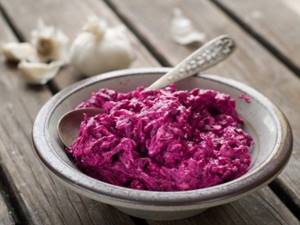
The benefits and harms of raw and boiled beets
The beneficial properties are due to the mineral and vitamin composition of the product. It contains sodium, potassium, calcium, manganese, selenium, iodine, magnesium, sulfur, zinc, arginine, choline, phosphorus, cesium, rubidium, vitamins B, C, A, E, K, PP and other components. The product contains gamma-aminobutyric acid, which affects the metabolism of the cerebral cortex. Pectins (1.1%) and fiber (0.9%) remove breakdown products and heavy metal salts from the intestines. Citric, malic, lactic, and oxalic acids, which are contained in the root vegetable, have a positive effect on digestion.
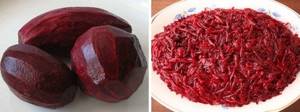
Vitamins will strengthen the immune system, improve vision, nervous system activity, and the condition of nails, skin, and hair. Iron is beneficial for the female body, restoring blood loss and protecting against anemia. Beta-carotene is an antioxidant that prevents aging and helps fight harmful substances. Only 100 grams of beets per day will replenish the supply of nutrients in the body and improve well-being.
- How to lower blood sugar
- How to choose a private detective - hire, prices for services and activities
- Belarusian surnames - a list of the most common male and female ones, their declension and origin
In addition to the benefits, the use of vegetables has limitations due to certain human diseases. It is not recommended for use for osteoporosis, urolithiasis, gastritis, and diabetes. People suffering from calcium deficiency should not overuse beets - the root vegetable reduces the body's ability to absorb it.
Contraindications and side effects
Beets have a number of contraindications. It is prohibited to eat raw or heat-treated vegetables if you have the following pathologies:
- acute stage of gastritis;
- increased stomach acidity;
- urolithiasis disease;
- osteoporosis;
- tendency to diarrhea and stomach upsets.
You should not get carried away with beets if you have diabetes, since the root vegetable contains a certain amount of organic sugars: the daily serving of vegetables should be no more than 70 g raw and 140 g boiled.
Like any other product, beet will be useful only within reasonable limits. Abuse of raw or boiled vegetables can cause diarrhea and exacerbation of the chronic diseases listed above.
Don't be alarmed if you see red urine when you urinate. The reason for this coloring is anthocyanins - special pigments of organic origin contained in beet pulp. If your overall health is normal, then there is no reason to worry: anthocyanins are quickly eliminated from the body and urine returns to its previous color. But when the pink tint of urine lasts for several days after drinking beet juice or eating beetroot, there is a good reason to see a doctor.
History of beets
They began to eat the leaves, and only then the root vegetable itself. The Romans soaked the tops in wine or vinegar and seasoned them with pepper. Enslaved Germanic tribes paid tribute to Rome in beets.
Beetroot came to Rus' from Byzantium. The vegetable was cultivated already in the 11th century and the Greek name for the root crop “sfekeli” passed into the Slavic language in a distorted form: “beet”. In the southwestern regions of Russia, Belarus and Ukraine, the plant is called beetroot, or beetroot. Sometimes beets acquire a brown tint when cooked due to the mineral composition of the water. Pickled or frozen root vegetables can also turn brown, which does not in any way affect its properties and taste.
Beetroot salad
An original salad with a slightly spicy flavor is sure to find a place in the heart of any gourmet.
Compound:
- 500 g beets;
- 100 g sour cream;
- 50 g horseradish;
- 1 tbsp. lie Sahara;
- 2 tbsp. lie vinegar;
- a bunch of mint;
- cinnamon and salt as desired.
Let's look at the technological map of beet salad with sour cream. Boil thoroughly washed vegetables, peel and cut into thin slices. Sprinkle with vinegar so they don't lose color. Chop the mint and mix with sour cream, grated horseradish, cinnamon, salt and sugar. Dressing the salad.
The calorie content of the dish is 125 kcal.
Benefits of beets
Beets contain many vitamins and microelements. This vegetable holds the record for the concentration of boron and manganese. In terms of iron content, beets are second only to garlic. These microelements activate hematopoiesis and regulate metabolism.
Betaine contained in this root vegetable takes part in the formation of choline, which improves liver function.
Beets are extremely useful for constipation and problems with intestinal flora. Pectin suppresses the activity of putrefactive intestinal bacteria and envelops the inflamed mucosa.
Beets are rich in organic acids: malic, citric and tartaric.
The energy value of beets is 42 kcal per 100 g due to the high sugar content.

Losing weight with beets. Is it possible to?
While some still doubt whether it is possible to eat raw beets, the most motivated women are already trying out all sorts of beet diets. And for good reason. After all, the benefits of beets for weight loss are enormous!
Red beets contain a large number of substances that literally destroy fat in the human body, namely:
- betaine
- fiber
Thanks to these components, losing weight with beets is quick and painless, because betaine greatly accelerates metabolism (thus provoking the conversion of fat cells into energy), and fiber removes all excess from the intestines.
At the same time, boiled beets for weight loss are almost as effective as raw ones. The main thing is not to mix beets with mayonnaise, fatty fish (meat) and excessive amounts of vegetable oils. Because these products nullify almost all of the “weight-loss” effect of beets. Naturally, beet salad is not tasty to eat without any oil. However, be careful...
Use of beets in medicine
Beetroot brings the main benefit to patients with constipation and other congestion. Fiber and organic acids of beets enhance intestinal motility, pectin reduces inflammatory processes.
This vegetable is useful for the prevention of vitamin deficiency and scurvy, as it contains a high concentration of ascorbic acid and carotene, especially in the tops.
Beets have a beneficial effect on the cardiovascular system and help lower blood pressure thanks to magnesium. The substances contained in this root vegetable help strengthen the walls of capillaries and have a vasodilating, antispasmodic and calming effect.
Beets are a natural antiseptic. Suppresses the development of putrefactive bacteria in the intestines, and the juice reduces inflammation of the skin and oral mucosa. To speed up wound healing, crushed beet leaves are used.
“Beets are very useful for anemia, general exhaustion of the body and loss of strength, since they contain a large amount of iron and other trace elements,” says Alexander Voinov.
Beetroot during pregnancy and breastfeeding
Can pregnant women eat beets? Yes, but provided that the woman has normal or high blood pressure. People with hypotension should eat beets with caution.
It should be understood that beets can bring tangible benefits during breastfeeding and pregnancy. And not in the distant future, but right the next day. After all, many pregnant women experience chronic constipation (especially while taking iron supplements), and beets with their coarse fiber will be very helpful here.
If the beets also grew in fertile soil, then in addition to everything else, they will provide the woman’s body with vital, but rarely remembered micronutrients (molybdenum, boron, chromium, cobalt, vanadium, etc.). The influence of these elements on the health of pregnant and lactating women is very great, because they are involved in hundreds of processes in the body.
And, of course, all these “rare” microelements enter the body of babies who feed on the “vital juices” of future and existing mothers.
